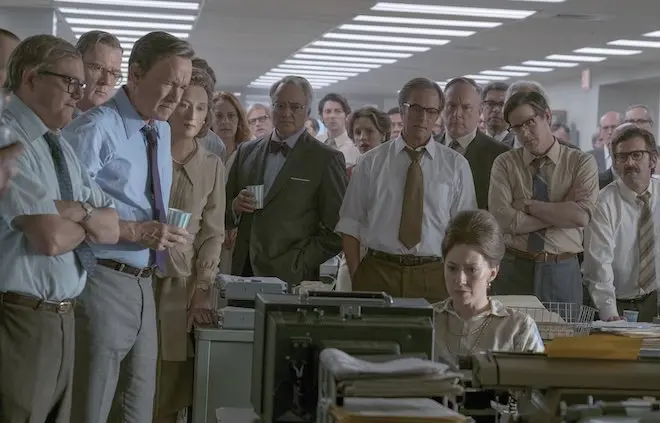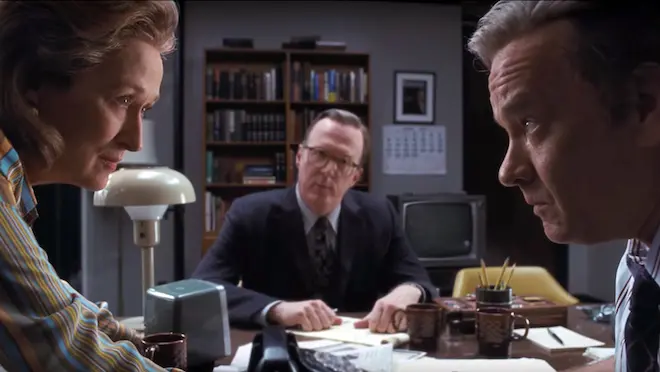In Steven Spielberg’s new film, The Post, the free press in under attack by an unpopular president after new documents are leaked proving that the U.S. government conspired to do nefarious, very un-American things and then covered it all up. Sound familiar? In one of the most timely films of our time, The Post has many uncomfortable parallels to what’s going on in our government today. You know what they say; If you don’t learn from the past, you are cursed to repeat it.
The Post stars Tom Hanks as Ben Bradlee, the long time editor of the Washington Post. His boss is the paper’s owner, Kay Graham, played by Meryl Streep, who is a woman in a man’s game and has little respect from her peers. When a government cover up about the true causes of the Vietnam war leaks to the New York Times in the form of the “Pentagon papers,” Nixon’s White House is quick to act, threatening legal action. The Times pulls back on its reporting, giving Bradlee and Kay Graham the opportunity to take up the mantle and to get the truth out, even if it means arrest for treason and a shut down of the paper.
The Post features an ensemble cast, including Bob Odenkirk and David Cross, together again as fellow reporters under Bradlee. Tracy Letts stars at Fritz Beebe, Kay’s confidant, and Bruce Greenwood takes on the role of Robert McNamara, a key player in the conspiracy and cover up. Spielberg peppers his cast with many familiar faces and each role serves as a piece of the puzzle, creating a tense thriller that pushes the envelope on the role of the press in a free society, and the value of truth no matter the cost.
The script by Liz Hannah and Josh Singer doesn’t try to get into the politics of the Vietnam war, using the Pentagon papers solely as a MacGuffin to drive the drama of will they/won’t they of Bradlee and his team publishing the story, even after the “Gray Lady” refuses to do so under pressure. In many ways, The Post succeeds where 2015’s Spotlight light failed, as the tensions of the conflict create some white-knuckle moments, even when talking about something as certifiably boring as the ins and outs of the newspaper business circa 1971.
The Post is a timely film, and some could argue that it may be the most important film of the year. Pick up a newspaper today (if you can find one) and see the same things happening again, with an administration so corrupt from top to bottom, that the Steele Dossier, the report on Trump and his Russia dealings (including the infamous Trump “pee-pee tape”) is the new Pentagon papers, and in the end, with the free press working to expose the truth, Trump could very well succumb to the same fate as Richard Nixon. That’s what makes this film sizzle on screen. That specter looms over the entire production and gives it a level of gravitas not seen in many new films in theaters today.
When “fake news” is used to discredit institutions that have, for generations, provided a light of truth in the dark hallways of corruption, we, as a people, suffer. History will not be kind to those who actively work to block the free press from the truth, and The Post reminds us all of that. We just hope that it doesn’t take 50 years for our current story to be told.
The Post is rated PG-13 and is in select theaters now and opens wide on January 12.





